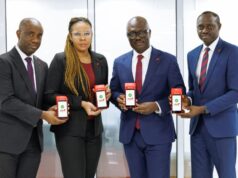MON, 24 OCT, 2022-theGBJournal| Moody’s Investors Service (Moody’s) has downgraded Nigeria’s local currency and foreign currency long-term issuer ratings as well as its foreign currency senior unsecured debt ratings to B3 from B2 and placed them on review for downgrade.
Concurrently, Moody’s downgraded Nigeria’s foreign currency senior unsecured MTN rating to (P)B3 from (P)B2, also and placed it on review for downgrade.
Moody’s says the rating downgrade is driven by the significant deterioration in Nigeria’s government finances as well as its external position, exerting increasing pressure on the sovereign credit profile despite a strong increase in international crude oil prices in 2022.
Moody’s assessment is that these developments are partly the result of weak governance and likely to last. The steep fall in oil production in 2022 and the extension of the expensive oil subsidy have almost entirely eroded the boost to government revenue and exports that would otherwise have been anticipated from higher oil prices. Policy levers available to manage weaker oil revenue and rising borrowing costs amid monetary tightening in Nigeria and globally are limited.
Similarly, on the external front, the capacity of the Central Bank of Nigeria (CBN) to protect foreign exchange reserves from external outflows has its limits.
According to Moody’s, the initiation of the review for downgrade is prompted by the risk that the ongoing fiscal and external deterioration accelerates, weakening further the government’s capacity to service debt and thereby increasing further its risk of default.
The review will focus on understanding the Nigerian authorities’ strategy to address both domestic and external pressure and assessing the associated default risk for the government’s private creditors.
On 13 October 2022, the government publicly stated possible options, consisting of extending the maturity of its debts, including through potential bond buybacks or exchanges, which may constitute a distressed exchange under Moody’s default definition.
Concurrently, Moody’s has lowered Nigeria’s local currency (LC) and foreign currency (FC) country ceilings to B1 and B3 respectively, from Ba3 and B2 respectively. The LC country ceiling at B1 remains two notches above the sovereign issuer rating, incorporating some degree of unpredictability of government actions, political risk and the reliance on a single revenue source. The FC country ceiling at B3 remains two notches below the LC country ceiling, reflecting significant transfer and convertibility risks given the track record of imposition of capital controls in times of low oil prices or falling oil production.
Rationale for the rating downgrade to B3
Nigeria’s fiscal and external position hasn’t benefited from higher oil prices in 2022, which have been 42% higher on average than in 2021. This is due to the 32% drop in oil production since the beginning of the year (recorded between January and September of 2022) and growing domestic consumption of petroleum products – a product of the country’s stage of economic development further incentivized by the expensive oil subsidy. The constraints on oil production increasingly appear structural, caused by repeated theft and lack of investment in infrastructure. While the oil sector is a relatively modest contributor to GDP, it is a primary source of revenue and foreign exchange generation.
On the fiscal side, the scope for the government to deliver on fiscal consolidation is constrained: Moody’s expects government debt affordability to weaken further in the years to come from already very weak levels. Ultimately, as the government dedicates a growing share of its revenue to paying interest, the policy dilemma between servicing creditors and meeting the population’s demand for social and economic development will intensify.
In particular, the cost of oil subsidy will soon absorb the whole revenue flow from the sector unless the subsidy mechanism is wound-down—a task that has been delayed multiple times despite the country’s intensifying credit pressures. Nigeria’s Ministry of Finance has recognized the pressing need to remove the oil subsidy, but its removal from mid-2023 onwards will likely prove difficult politically and to implement in practice. Meanwhile, the generation of non-oil revenue has gradually progressed broadly in line with budget targets but remains far from compensating for the lower oil revenue net of subsidy and higher interest payments. Therefore, Nigeria’s share of revenue consumed by interest payments, which is already exceptionally high in 2022 at 65% at the federal government level and 35% at the general government level, is set to rise further. The Minister of Finance recognized in public statements that this budget constraint is a growing source of concern.
Externally, financial and capital outflows from Nigeria are exceeding the current account surplus, eroding foreign exchange reserves. CBN’s foreign exchange reserves declined by $3 billion since the beginning of the year, reaching $37 billion as of September 2022. To limit the fall in reserves, the CBN’s main policy response has been to ration foreign exchange liquidity, scaling down the size of its interventions in foreign exchange markets and accumulating a backlog of foreign exchange demand. Meanwhile, depreciation pressure on the currency has intensified, with the gap between the official and parallel market exchange rates widening. The limited foreign exchange liquidity has also affected banks and companies operating in Nigeria with need of cross-border transactions.
The review for downgrade reflects the risk that external and fiscal pressure further intensifies and constrains the government’s access to funding. Government external debt payments remain contained over the coming years – and mostly due to the official sector – but sizeable enough to add to the external pressure absent external funding. Domestically, both the banking sector and CBN have important exposure to the government.
The review will focus on the authorities’ policy response to alleviate external and fiscal pressure, including their strategy to manage debt service obligations and foreign exchange reserves, and their capacity to raise significantly government revenue. In that regard, the government has already announced that it is exploring options to lengthen the maturity of its debts, which may help limit the size of future funding requirements but could constitute a distressed exchange under Moody’s definition depending on the terms and the debts affected. The review will also assess the likelihood of a devaluation of the currency, which the country resorted to in 2016 and which would increase the government’s debt burden, weaken its affordability since 30% of the debt is denominated in foreign currency and raise social risks by fueling inflationary pressures. If sizeable, a devaluation of the naira would also exert downward pressure on the rating.
Nigeria’s ESG Credit Impact Score is very highly negative (CIS-5), reflecting very high exposure to environmental risk and social risk and very weak governance that, with low wealth levels, leads to low resilience to E and S risks.
For Nigeria, exposure to environmental risks carries very high credit risks, reflected in its E-5 issuer profile score. Exposure to carbon transition risk is very high, given the very significant reliance on oil for the public sector and the economy as foreign exchange earnings from oil represent 80% of merchandise exports. Nigeria’s credit profile would face downward pressure in a scenario of more rapid global carbon transition than we currently assume and that implied by stated policies internationally. Water risk and physical climate risk are also high, driven by the high share of the population exposed to unsafe drinking water, risks of flooding and heath stress, as well as risks from waste and pollution respectively.
Exposure to social risks is very highly negative (S-5 issuer profile score), mainly related to poverty, low education outcomes, and poor health and safety indicators and access to basic services. Infant mortality is one of the highest in Sub-Saharan Africa and poverty is widespread, with close to 40% of the population living on less than PPP$1.90 a day despite vast natural resources wealth. The successive oil shocks and the pandemic have exacerbated the exposure to social risk. GDP per capita remains well below 2015 figures, with growing inequality due to the most vulnerable households carrying a disproportionate part of the burden of successive shocks.
Nigeria has a very highly negative governance profile score (G-5 issuer profile), reflecting weak control of corruption and rule of law as well as very weak fiscal and monetary policy effectiveness and opaque management of public resource. Management of oil revenue is particularly weak; absent fiscal stabilizers, the government runs pro-cyclical policy or worse fails to take advantage of high international oil prices as illustrated in 2022. In 2021, the country’s hydrocarbon exports amounted to $41 billion, the general government received only $5 billion in net oil revenue or 1% of GDP.- Moody’s
Twitter-@theGBJournal| Facebook-The Government and Business Journal|email: gbj@govbusinessjournal.ng|govandbusinessj@gmail.com










